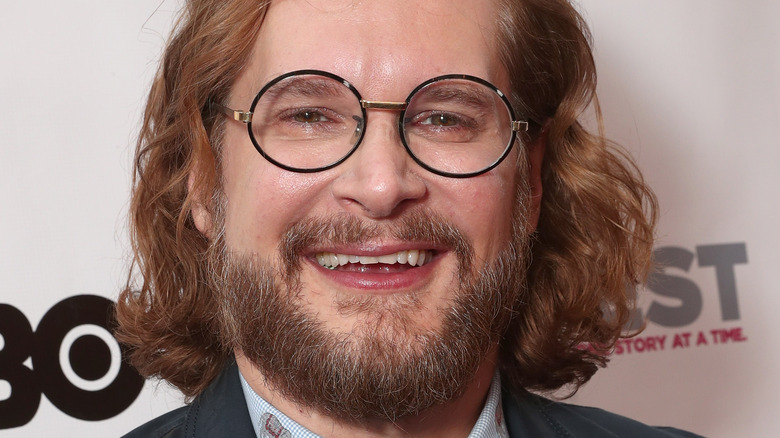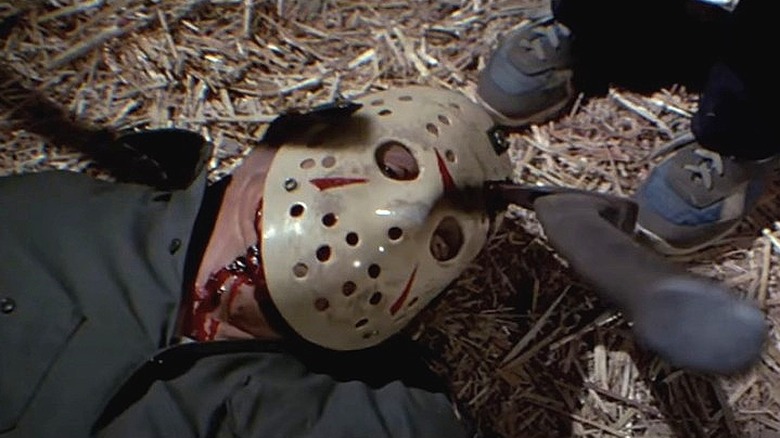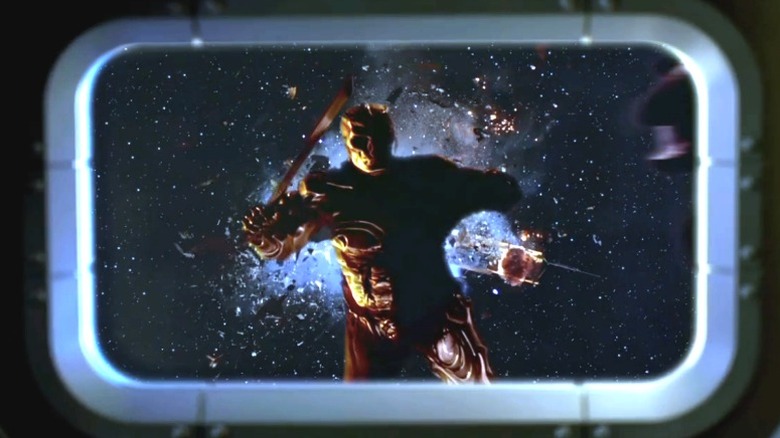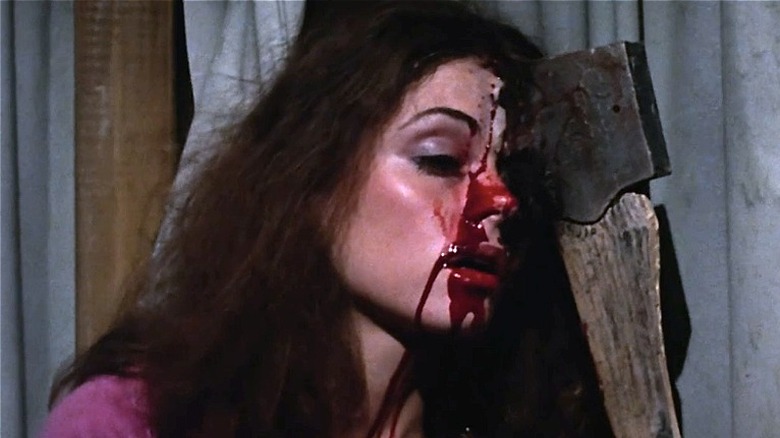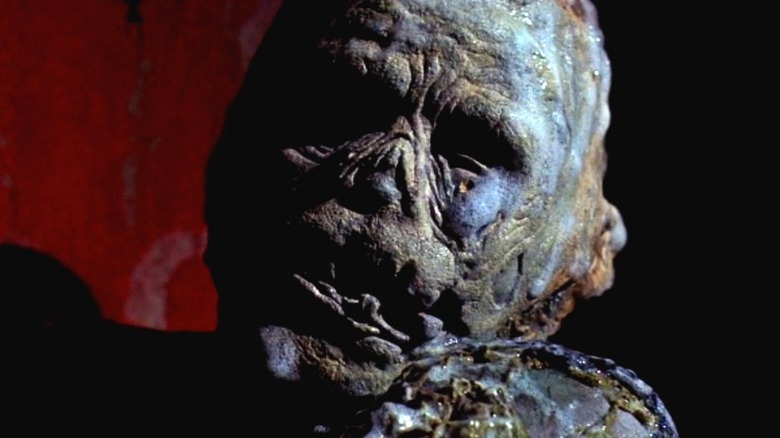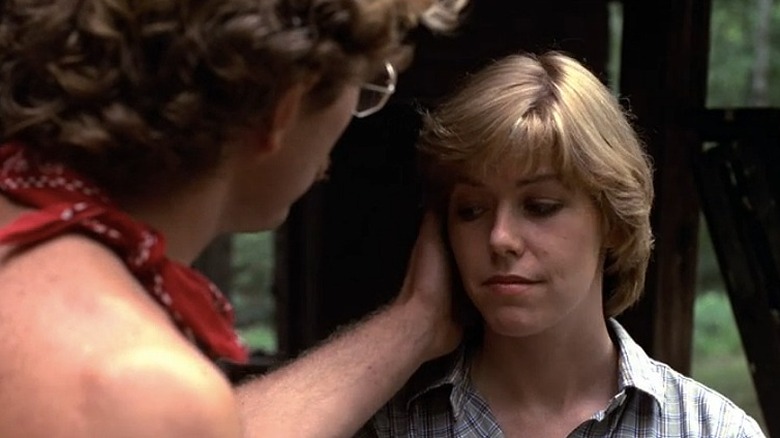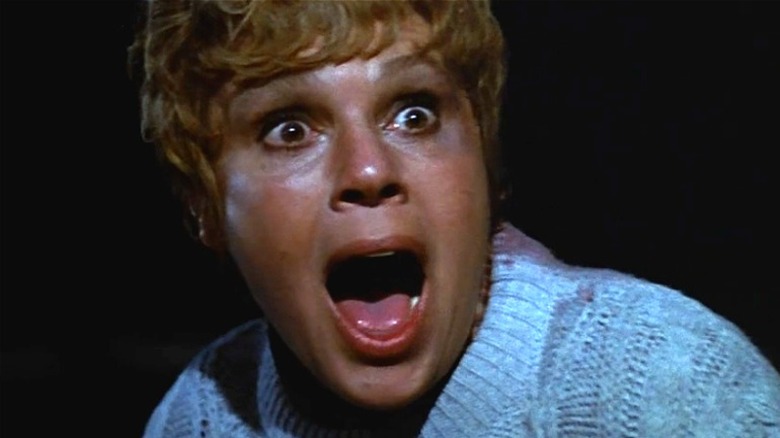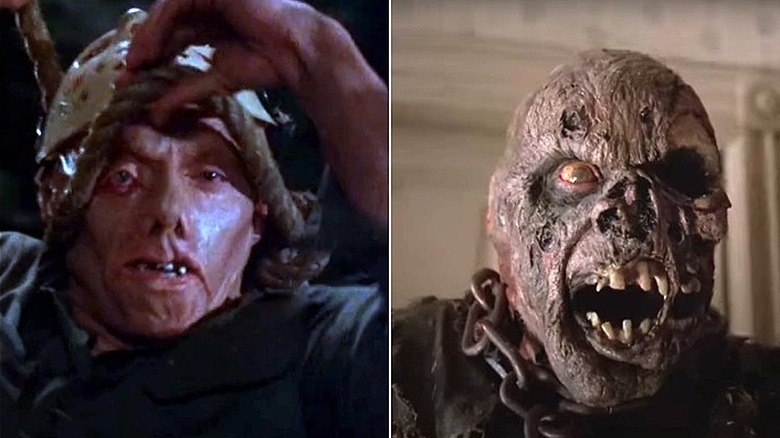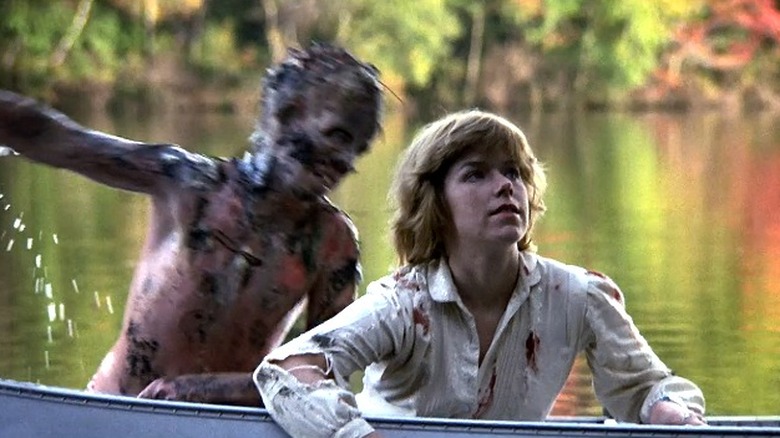Here's How Crystal Lake Could Resurrect The Friday The 13th Franchise ... Or Chop It Back Down
"I gotta tell you something," Stephen King says to director Eli Roth in the latter's "History of Horror" — "the worst horror movie I ever saw was ******* great, okay? Because I go in there and say, 'What am I gonna see? I don't know.'"
Given the millions upon millions of dollars the genre pulls in each year (even in 2022, when superheroes reign so inescapably supreme), it seems it's a sentiment to which audiences can relate (via CNN). The idea that even the worst horror narrative still has something to offer is inarguably what's kept the "Friday the 13th" franchise alive and well for nearly half a century. And now, after lengthy rights dispute with almost as many twists and turns as Jason Voorhees' convoluted storyline, an upcoming prequel series about the setting where it all began, "Crystal Lake," is officially and finally in the works.
But before it can dive into the infamously unsupervised body of water, the series will have a decision to make about whether it wants to resurrect or dispatch forever, one of the most profitable horror franchises of all time (via Forbes). Thanks to the unique devolution of the franchise itself, the series' approach to achieving its desired outcome must necessarily be, on the surface, somewhat counterintuitive. Meaning: a compelling, complex, and genuinely terrifying full circle treatment might finally allow Jason to rest in pieces while leaning into the same tonally confused, thematically brainless, and (delightfully) narratively ludicrous ethos of its predecessors.
Friday the 13th has a tone all its own
Let's start with Door 2, shall we? Behind it lies an infinite amount of future reboots, remakes, sequels, prequels, and requels; a commercial opportunity almost as un-killable as Jason himself (that is, now that "Crystal Lake" has the rights to everything in the franchise, per CBR). While most IP comeback attempts strive to re-inject creative integrity and meaning into franchises that have fallen by the wayside, "Friday the 13th" has proven, time and time again, that abject "badness" can be every bit as beloved (aka profitable) as critical acclaim.
Audiences may have started by genuinely engaging with the horror at play in the films, but somewhere along the way (probably right around "Friday the 13th VI: Jason Lives"), fans began laughing with it. Later on (probably right around "Part VIII: Jason Takes [a cruise ship to] Manhattan"), they started laughing at it. Eventually, however — though the exact point of departure may be open for debate ("Jason X;" it was definitely "Jason X") — fans found themselves struggling to find anything to laugh with or at but the notion that a studio would be so willing to deliver a joke it didn't understand.
Nevertheless, while the novelty of the slapstick may have lost its shine, the franchise's novel appeal remains and could easily be refreshed with a bit of elbow grease and an awareness of past missteps.
Crystal Lake could help us forget Jason X
"Crystal Lake" has something going for it that "Jason X" did not: distance, perspective, and context. The 2002 film came out well after the self-aware "Scream" brought the slasher back to life. Still, thanks to time and budget constraints (and the fact that it was only ever made to distract from the wait for "Freddy vs. Jason," per GQ), it ended up setting the genre back ten years even as it sent Jason over four hundred years into the future.
At the same time, the commentary the earlier and middling films alluded to (sometimes even intentionally) no longer spoke to a society that'd only recently listened to their president talk openly (if dishonestly) about a sex act and even more recently focused its fears and anxieties on literal terror. Perhaps that's why "Jason X" decided to throw what little spark and humor the franchise had out the window in favor of rave fashion, Nu metal, and Cool Outer Space Words and Noises.
There are plenty willing to defend the film (via Reddit), and its hackneyed attempt at an environmentalist agenda is, technically, "there." Still, the fact remains that once you've thrown your villain into outer space, looked directly into the camera, and said, "D'YOU GET IT? 'CUZ WE'RE NOT DOING A SERIOUS?" you've lost both the plot and the punchline. But it's been two decades since "Jason X" went so irreversibly off course, and "Crystal Lake" is in a perfect position to return the franchise to its former gory glory without taking itself too seriously.
Silly can still work
Produced by the revered A24, written and run by the outspoken and frequently pink-slipped Bryan Fuller, and co-executive produced by original writer Victor Miller, "Crystal Lake" is packing some serious creative ammo. Suppose the upcoming series decides to honor the franchise's more intentional humor. In that case, it need only worry about distinguishing itself from the beloved "American Horror Story: 1984" and figuring out what, and who, it's supposed to be laughing at. The "Friday the 13th" films only occasionally seem to know about the latter. From one to the next, it's difficult to discern whether they mean to poke fun at themselves, their genre, their era, Jason, Jason's victims, the folly of youth, the absurdity of hot people, the audience, the critics, or, in some of the most simultaneously "ambitious" and baffling installments (e.g., whatever "Jason Goes to Hell" was), everything, and nothing, all at once.
As viewers, whether we're laughing with or at these films, the appeal ranges from a difficult-to-replicate, "no explanation necessary" amusement to a more deeply-rooted, more prominent, good old-fashioned love of nostalgia. But like fandoms themselves, nostalgia is a fickle beast. Try too hard to give the people what they already know and love — but can never love in the same way because it's new — and you end up with "The Force Awakens:" a remake whose own merits are clouded by the fact that it's not its predecessor.
...even if it doesn't
Nostalgia pitfalls notwithstanding, the decision to stay faithful to what the franchise has thus far given us comes with significantly less risk. Even if "Crystal Lake" fails to nail the elusive attraction, the messy ridiculousness and live-action cartoonish-ness that has for so long cemented fan loyalty will still, in some respects, be a success. Disappointment, lousy writing, inconsistent backstory, tone, and pace are all part of the franchise's identity. And not even "Jason X" could kill that identity; it simply froze it in the (often) aesthetically and creatively cringe-worthy early aughts. Now that it's had some time to thaw, so long as the prequel has enough gory realism to keep up with contemporary slasher flicks, enough creative kill shots to carry audiences from dialogue exchange A to B, and enough well-executed humor to elicit at least a few snickers, it will succeed in re-opening the door for future installments.
Or, A24 and Bryan Fuller could choose to open Door 2. They could choose to tell, as so many of the biggest A24 movies have, a complex and layered narrative that knows what it wants to say or ask, handles its message or inquiry with subtlety and nuance, forces us to confront our humanity and our mortality, and explores the darkest recesses of our psyche. This approach will open the series up to a broader audience and, from an artistic standpoint, redeem and flesh out some of the decades-old storyline's more confounding plot points and missteps. It will also signal the (actual) death of the franchise.
Playing it straight is a double-edged sword
By Victor Miller's admission (via YouTube), the original was merely an attempt to cash in on the popularity of the more frequently lauded "Halloween." And yet, despite the film's low-hanging fruit motivation, it contains a surprising amount of commentary. From the lecherous and assumptive manner with which the Truck Driver (Rex Everhart) and Steve Christy (Peter Brouwer) treat the young women who've put their trust in them to the fact that the killer is not Jason Voorhees but his mother, "Friday the 13th" explores more than its legacy has implied. By taking time with some of that initial commentary, "Crystal Lake" might prevent future franchise momentum, but it will also add complexity and depth to everything that's come before.
The original is not suggesting, as is so often assumed, that booze, drugs, and premarital sex will get you killed. It's not the protagonist, or a character we're meant to care about at all (much less adhere to ideologically), who punishes teens for their "wild" behavior. It's the villain and a particular kind of villain: evil in the guise of trustworthy, sweater-wearing authority. She'll become even more critical if "Crystal Lake" chooses to play this one straight.
But a Mrs. Voorhees revival is long overdue
Betsy Palmer's Pamela Voorhees is ripe for a reboot. In 1980, she was the gap between what America was being sold and what the average American could afford to buy; as the franchise moved further into the decade, her shifted-blame fantasy lived on in Jason. She's the evil behind the pointed, puritanical finger, the false security of confirmation bias, the claws beneath polite society's kid gloves.
And there's never been a better time to bring her back.
Given the track record of the series' creative and production team, a more thorough exploration of the once and future queen of kills feels appropriate and likely. Of course, while doing so would inevitably elevate the franchise, it would also bring it full circle and imbue it with a seriousness and weight from which it couldn't simply re-devolve. A story can go from silly to sillier over time but has a hard time going from serious back to absurd throughout one chapter. What's more, since so much of the franchise's identity lies in the intangible appeal of that silliness, a major tonal shift would serve more as a party-ending record scratch than a stand-alone installment set for a follow-up (particularly considering that follow-up has already happened, and includes 12 films). And yet, there is something to be said for bringing the story to an era-appropriate conclusion.
And a peek behind Jason's mask could be beneficial
Despite the flashbacks and fill-ins that have accompanied Jason Voorhees' backstory, we know very little about the victim-turned-killer-turned-protagonist's psychology. Fans have grown to love and root for Jason throughout the franchise, but our sympathy has less to do with society's treatment of him and more with his increasingly insufferable targets. We know equally little about his physicality, mental state, and intellectual capacity since references to and depictions of both have been so inconsistent.
In an era so severely damaged by the heavily-filtered and photoshopped faces of various social media platforms — platforms that can and do, as the World Institute on Disability explains, cause mental illness and promote ableism — a closer look at Jason's isolation from and rejection by society feels appropriate from both a narrative and contextual standpoint.
Jason may be, in most of the installments, an obvious embodiment of these themes — see: "Part VI: Jason Lives" as a not-so-subtle nod to Mary Shelley's "Frankenstein" — but while Shelley's sympathetic "monster" is both articulate and self-aware, "Friday the 13th" has only ever given us a silent and psychologically impenetrable killer. This isn't to say child Jason needs to wax poetic or treat us to lines like, "I have love in me the likes of which you can scarcely imagine and rage the likes of which you would not believe. If I cannot satisfy the one, I will indulge the other" (via Goodreads). But if "Crystal Lake" hopes to show us where it all began, giving Jason an actual inner world would at least offer something new (and arguably necessary).
But are we really ready to say goodbye?
On the other hand, maybe we're not ready for a justifiably sympathetic killer. We have, after all, remained a fan of the occasionally titular "villain" despite the franchise refusing to depict him as anything but one-dimensional — and maybe because of it. Suppose Jason's story's lasting and almost uninterrupted success has taught us anything. In that case, it's that (as Stephen King suggests) we don't always need, or even want (as AnOther's Alex Denney suggests), our horror to be elevated, our startles and screams and chuckles sacrificed in the name of thematic depth. It doesn't take a deep dive into the Voorhees' twisted psychology to tell us something about our own. While most of us would never actually support or strive to emulate Jason's actions, we're delighted by the opportunity to do so within the safe and fictional confines of a cartoonish horror movie.
"Friday the 13th" invites us, perhaps more than any other horror franchise given its enthusiastic lack of realism, to embrace our most anti-social impulses by proxy and root for and laugh at a monster who allows us to grapple with whatever we project onto him. And it's this long-welcomed opportunity, more so than an irreversible shift in tone or a full-circle conclusion to the ongoing narrative, that implies a more serious and insightful spin on the story.
